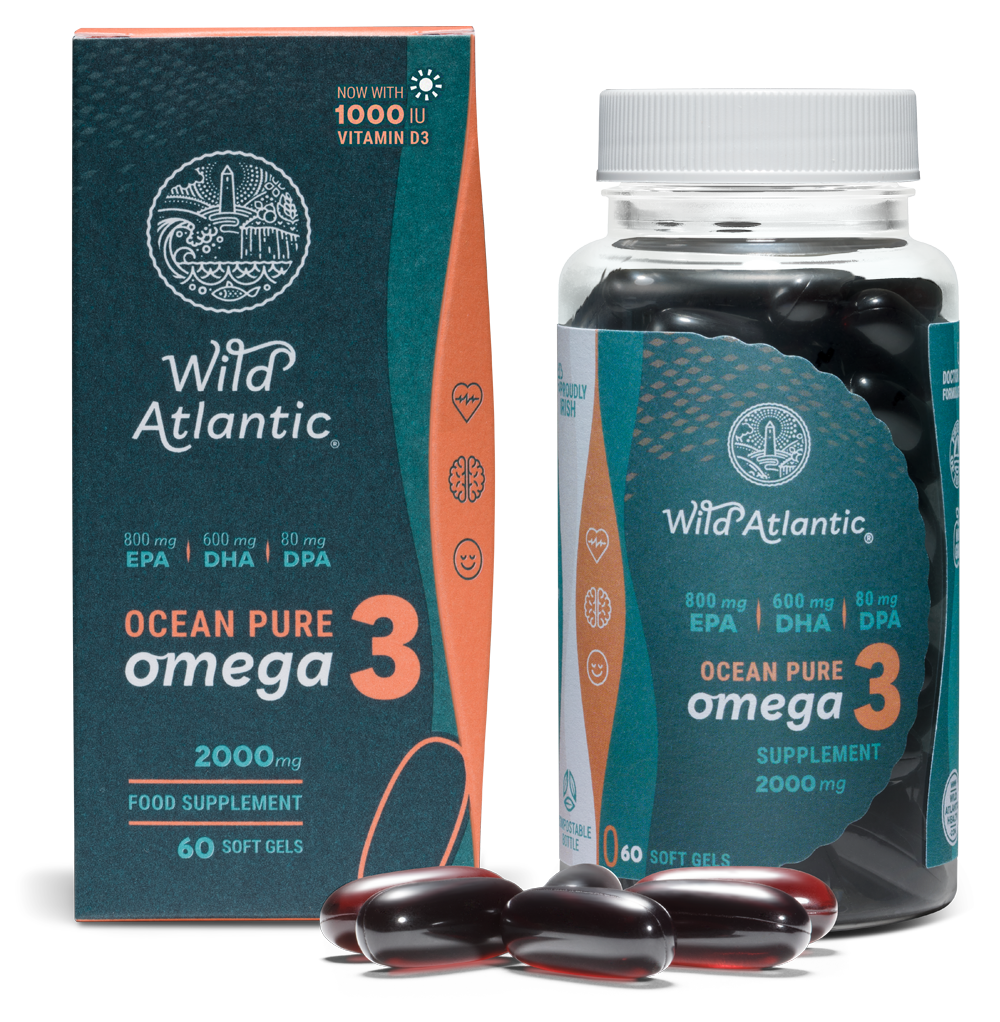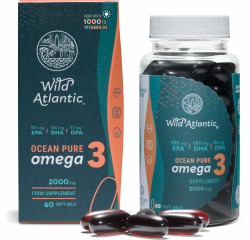



What is Fish Oil?
Fish oil is extracted from oily fish such as Salmon, Mackerel, anchovies, sardines, herring, and tuna. The World Health Organization recommends consuming 1-2 servings of fish per week to obtain these omega-3 fatty acids. However, supplements can also provide much needed omega-3s if fish consumption is insufficient/absent.
Studies have shown that omega-3s in fish oil have greater health benefits than those in plant sources. Ongoing research is being conducted to further understand the potential health benefits of fish oil.
Origin and Extraction Process
Fish oil is obtained from the tissues of oily fish by a process known as mechanical pressing and/or solvent extraction. The oil is then refined and concentrated to increase its potency and reduce impurities.
The end product is a liquid containing omega-3 fatty acids, vitamin A, and vitamin D. Fish oil supplements are also available as capsules, liquids, and tablets.

Key Health Benefits
Consumption of fish oil has been associated with a range of health benefits, including:
- Mental health
- Eye Health
- Anti-inflammatory
- Skin health
- Pregnancy and early life
- Liver health
- Depression improvement
- Children’s attention and hyperactivity improvement
- Early life learning
- Prevention of mental decline
Additionally, it may improve asthma symptoms and reduce allergy risk. who wouldn’t want all of these benefits?
Heart Health
Omega-3 fatty acids play a role in cholesterol regulation, and their consumption has been associated with reductions in the risk of developing heart disease. It may reduce total cholesterol and triglyceride levels, raise HDL (“good”) cholesterol levels, and lower LDL (“bad”) cholesterol levels. It may also reduce inflammation, improve cell membrane fluidity, and reduce oxidative stress. Results from clinical trials suggest that fish oil supplements can help manage and reduce the risk of cardiovascular disease.
Mental Health Support
Research has suggested that fish oil is effective for treating depression and anxiety, as well as supporting cognitive function and brain health. Omega-3 fatty acids are essential for brain development and function, and studies have shown that people with mental health conditions may have lower omega-3 blood levels. Studies have shown that these supplements can:
- Reduce symptoms of depression
- Improve mood
- Reduce anxiety
- Increase cognitive function
Fish oil supplements may also reduce hyperactivity, inattention, and impulsiveness in children with neurodevelopmental conditions.
Eye Health
Studies have indicated that consuming fish or taking fish oil supplements may reduce the risk of age-related macular degeneration (AMD). Furthermore, omega-3 intake may play a role in visual development in infants, although further research is required to fully understand the benefits of fish oil on eye health. Fish oil supplements may not have the same effect as eating fish, however research suggests the following:
- Omega-3s are important for eye health.
- Insufficient omega-3 intake increases the risk of eye diseases.
- Eating fish is linked to reduced risk of AMD.
- Fish oil supplements may not have the same effect as eating fish.
Omega-3 fatty acids found in fish oil may be beneficial for visual development in infants and young children. Fish oil supplements are linked to improved infant visual development and reduced risk of age-related macular degeneration. Studies have shown that fish oil supplementation during pregnancy may play a role in the prevention of eye diseases in infants. Additionally, fish oil may help reduce the risk of eye diseases in adults. Despite the potential benefits, the effect of fish oil on other eye diseases is still unclear. Further research is needed to clarify the role of fish oil in visual development.
Anti-Inflammatory Properties
Fish oil has anti-inflammatory properties that can help reduce chronic inflammation. Studies have shown that fish oil supplements can help alleviate symptoms of certain autoimmune diseases by reducing the production and gene expression of inflammatory molecules. Additionally, fish oil supplements can reduce joint pain and stiffness in rheumatoid arthritis. Fish oil has been shown to:
- Lower levels of inflammatory proteins
- Reduce pro-inflammatory cytokine production
- Reduce the expression of inflammation-promoting genes
- Decrease oxidative stress-induced inflammation
Research suggests that omega-3 fatty acids from fish oil may help to alleviate symptoms of autoimmune diseases, like rheumatoid arthritis, lupus, and psoriasis. Fish oil has also been shown to reduce the severity of autoimmune conditions in animal models.
Skin Health
Fish oil contains omega-3 fatty acids, which have been shown to reduce skin aging and treat certain skin conditions. Studies have shown that fish oil supplements can help maintain healthy skin and reduce the risk of skin diseases such as psoriasis and dermatitis. Omega-3 fatty acids in fish oil can help protect skin cells from damage due to UV radiation and aging. Additionally, fish oil may help produce collagen, improve hydration, and reduce inflammation.
Research shows that regular consumption of fish oil can lead to:
- Decreased skin dryness
- Reduced wrinkles
- Improved skin texture
- Enhanced overall skin health.
Pregnancy and Early Life

Fish oil has been studied for its role in supporting fetal brain development and preventing pre-term labour. Omega-3 fatty acids in fish oil are essential for early growth and development. Thus, sufficient omega-3 intake is vital during pregnancy and breastfeeding. Studies suggest that fish oil supplements may improve fetal brain development and reduce the risk of pre-term labour. Studies have indicated that omega-3 fatty acids found in fish oil, particularly EPA, may enhance fetal brain development. Omega-3s are essential for optimal growth and development in utero.
These include:
- increased neurogenesis,
- improved neuronal survival,
- enhanced synaptic plasticity
- improved cognitive performance
Liver Health
Studies indicate that supplementing with fish oil may reduce fat in the liver and improve symptoms of non-alcoholic fatty liver disease (NAFLD). In a randomized, double-blind, placebo-controlled trial, daily supplementation with fish oil for 12 weeks resulted in a decrease in liver fat and improved liver function in NAFLD patients. Another study found that fish oil supplementation for 12 weeks could reduce inflammation in the liver and improve certain biomarkers of liver health in patients with NAFLD.

Mood Regulation
Studies have found that omega-3s may influence serotonin and dopamine production, which are important neurotransmitters involved in regulating emotions. This suggests that increasing omega-3 intake through diet or supplementation may help to improve mood and reduce symptoms of depression.

Childhood Health
Fish oil supplements have been associated with a reduction in ADHD symptoms, improved behavioral and intellectual growth, and a decreased risk of allergies in infants. Omega-3 fatty acids, which are found in fish oil, are essential for cognitive development in infants and young children. Therefore, supplementing with fish oil may have beneficial effects on childhood health.
Support in behavioral and intellectual growth
Consumption of fish oil may have a positive impact on behavioral and intellectual growth. Studies suggest that omega-3 fatty acids found in fish oil are important for early brain development in infants and young children.
Fish oil supplements have been shown to reduce hyperactivity, inattention, impulsiveness, and aggression in children with neurodevelopmental conditions. Supplementation with fish oil during pregnancy may also support healthy brain development in the offspring.
Cognitive Support in Elderly
The consumption of fish oil has been linked to a range of cognitive benefits, including a potential role in preventing Alzheimer’s and dementia. Studies have shown that fish oil can improve memory and cognitive functioning in healthy older adults, although further research is needed to fully understand these effects.
Preventing Alzheimer’s and dementia
Research suggests that fish oil supplements may help to prevent Alzheimer’s and dementia. Studies have found that omega-3 fatty acids found in fish oil may help to reduce inflammation in the brain, delay the onset of Alzheimer’s, protect against cognitive decline, and reduce the risk of developing dementia. Other benefits may include improved brain function and memory, and protection from oxidative stress.
Asthma and Allergies
Asthma and allergies are both inflammatory respiratory conditions. Omega-3 fatty acids found in fish oil have been linked to a reduction in inflammation and, therefore, may play a role in managing the symptoms of these conditions. Furthermore, omega-3 fatty acids are essential components of the immune response, which is important for managing the symptoms of asthma and allergies.
- Omega-3s in fish oil have been shown to reduce the production and gene expression of inflammatory molecules. This can help decrease inflammation in the respiratory system, often associated with conditions such as asthma and allergies.
- In addition to reducing inflammation, fish oil supplements may also help to alleviate joint pain and stiffness in rheumatoid arthritis. This is due to the anti-inflammatory properties of omega-3 fatty acids.
- High doses of fish oil have been found to be beneficial for asthma and allergies. They can help to reduce symptoms and improve lung function in individuals with these conditions.
- Another potential benefit of fish oil supplements is their ability to maintain healthy skin. Omega-3 fatty acids can help to nourish the skin from within, promoting a healthy complexion.
Role in immune response
Evidence suggests that fish oil may be beneficial in modulating immune responses. Studies have found that fish oil supplementation may reduce antibody production and improve immune response in some individuals. Omega-3 fatty acids found in fish oil may affect immune cell signalling pathways and cytokine production.
Bone Health
Fish oil is known to have a positive effect on bone health. EPAs are known to boost calcium levels in bones, helping to prevent osteoporosis. Studies have also found that fish oil may have a protective effect against bone loss and fractures. Studies have suggested that fish oil supplementation may help improve calcium absorption and bone mineralization.

It may:
- Increase the amount of calcium absorbed from food.
- Increase bone mineral density.
- Increase the amount of calcium stored in bones.
- Increase the production of bone-building cells.
Further research is needed to understand the exact effects of fish oil on bone health.
Preventing osteoporosis
Omega-3 fatty acids found in fish oil may play a role in preventing osteoporosis. Studies have suggested that the omega-3s found in fish oil can influence bone mineral density, leading to stronger bones and a decreased risk of osteoporosis. Adequate calcium intake is essential for good bone health, and fish oil may help to improve calcium absorption. In addition, fish oil may reduce inflammation, which can help to preserve bone health.
Dosage
The recommended daily intake of fish oil depends on an individual’s age, weight, and other health factors. Factors such as omega-3 fatty acid content, lifestyle, and health goals may also affect the dosage of fish oil. It is important to consult with a healthcare professional to determine the appropriate dose of fish oil for an individual.
Visit our Omega 3 Calculator to really get insight into how much you need.






























